
Pag mamano
Manuel Luís Quezon y Molina Sr. : Address (1938)[]
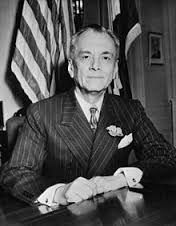
Manuel Luís Quezon y Molina (August 19, 1878 – August 1, 1944) was a Filipino statesman, soldier, and politician who served as president of the Commonwealth of the Philippines from 1935 to 1944. He was the first Filipino to head a government of the entire Philippines (as opposed to the government of previous Philippine states), and is considered to have been the second president of the Philippines, after Emilio Aguinaldo (1897–1901). Quezon was a Spanish Filipino, with both his parents being Filipino mestizos.
Quezon was the first Senate president elected to the presidency, the first president elected through a national election, and the first incumbent to secure re-election (for a partial second term, later extended, due to amendments to the 1935 Constitution). For pushing Commonwealth Act No. 184 that established the National Language Institute and a consequent Philippine national language, Quezon has been tagged as his country's "Father of the National Language".
Address of President Manuel L. Quezon on Policies and Achievements of the Government and Regeneration of the Filipino[1][]
[Delivered before the faculties and student bodies of public and private schools, colleges, and universities, at the José Rizal Memorial Field, August 19, 1938]
This unprecedented assemblage of the faculties and students of all the universities and of the teachers and pupils of the public and private schools of Manila, for the purpose of doing me honor on the occasion of my birthday, thrills me with unbounded happiness, for I see in this fine and generous tribute not only your kindly feelings for me but also your approval of the policies and achievements of my administration during the last three years. This expression of your friendship and support will spur me to go onward with renewed faith in the policies I have pursued and with redoubled determination to carry them to a successful completion.
While it may be tedious to review the objective and purposes or the accomplishments of my administration [2], I feel it my duty at this time to give a brief account of my stewardship of public affairs during the first half of my term of office.
Since the inauguration of the [Commonwealth], it has been my task to erect the governmental structure upon the broad and unshakeable foundations of the Constitution. I have established precedents which, I hope, will serve as signposts in the administration of the public business. My eager purpose has been to give vitality and power to democratic processes and to adapt them to the ever exacting demands of the complex [social and political problem of our day. We have succeeded, I believe, in proving that representative government in the Philippines can be as competent in action as it is fundamentally sound in prnciple; that it can act promptly and effectively in any emergency, without sacrificing either its form or substance; and that a régime of popular deliberation and expression can promote social welfare and the happiness of the people.
Keeping faith with the spirit of the Constitution, as I understand it, I have acted as the leader of the nation rather than as the spokesman of a political party. I have chased narrow partisanship from the councils of government. I have scrupulously maintained religious freedom and the separation of Church and State. I have safeguarded free thought, free expression, and the unbridgeable right of the people to work, and to possess and enjoy the fruits of their toil. Every possible precaution has been taken to insure speedy and impartial justice, maintaining, in fact, the equality of all men before the law. I have not tolerated corruption, inefficiency, or injustice in public office; and I pledge myself to persevere in my efforts to sweep every nook and cranny of the Government clean of every deleterious influence that might impair the vitality of the body politic. I have kept the public finance in a sound condition and have succeeded materially in introducing approved business practices in the management of the people’s money.
Having set up the Government, the next concern of my administration was to safeguard it against possible dangers from within and without. It was necessary to erect effective defenses against subversive movements, the possible tyranny of aggressive minorities, or the danger of mob rule. That has been accomplished. The Philippines is definitely secured against lawlessness and disorder, and I shall offer no quarter to any man or group of men who seek to attain social or political aims through force or resistance to legitimate authority, in preference to the expeditious procedure guaranteed by the Constitution to everyone who desires a redress of grievances. The armed forces of the Nation will be maintained free from politics and as clear and unstained of pernicious influence as the courts of justice.
Our national defense is being organized without reference to any foreign aggressor. I can see none now. We are surrounded by friendly nations that, I believe, entertain no untoward designs against us. It shall be to our lasting benefit to maintain these friendly relations, avoiding every act that may disturb them or which may entangle us in the quarrels of others. After we shall have attained the full stature of independence, I trust that our foreign policy shall be fair and just to all nations, granting special privileges to no one, and seeking none for ourselves. As I look at the events of these days, I am strengthened more and more in my belief that if we follow this course we should have no fear for our national integrity.
In the field of public welfare, I have been unflagging in my effort to promote social justice and to ameliorate social conditions among the masses of our people. The attainment of these objectives depends not only upon economic and moral factors, but also upon the people themselves, for only through productive work can social standards be improved. Within the realm of government action, I believe I have advanced towards these objectives as far as the laws of the land or the circumstances have allowed. We have built schools, hospitals, and roads; we have extended the benefits of numerous other social services, particularly to the poorer classes of our population. We have endeavored to maintain industrial peace by increasing wages and improving working conditions. I have stamped practically all the important activities of the Government with a social purpose, because I believe intensely in the principle that it is the duty of the State not only to keep order, administer justice, and safeguard individual rights and property, but also to promote the people’s welfare, assuring to everyone an equal economic opportunity, wholesome living conditions, a chance to work for a decent livelihood, a fair share in the fruits of the country’s material progress, and the enjoyment of a standard of living in accordance with the basic needs of self-respecting intelligent men. My ambition is to give to every Filipino the opportunity to acquire through toil his necessities in food, clothing, and shelter, together with reasonable comforts, and a leisure which will permit cultural self-improvement and a participation in the blessings of an enlightened civilization. I should like to give to all our countrymen social security in youth as well as in old age, for themselves and their families.
The task of economic preparation for independence has not been overlooked. The Government has done everything to stimulate industry, help business, and promote material progress. I sought to reopen the question of our trade relations with the United States with a view to obtaining a modification of the economic provisions of the Independence Law. The President of the United States lent a sympathetic ear to my request and, in consultation with me, he appointed the Joint Preparatory Committee on Philippine Affairs, which committee has already studied the question of our future trade relations with America and submitted its recommendations. With the income that we are receiving from excise tax collections in the United States, and with the expected changes in our trade relations with America, I feel that we shall be in fairly good position to face the problems of economic readjustment and reconstruction, the solution of which we cannot long delay. I propose in the remaining years of my administration to give impetus to economic development pursuant to a carefully prepared plan.
I have briefly outlined my policies and our achievements during the first half of my administration, now about to close. I look upon these accomplishments and these policies as affecting merely the superstructure, the framework, of our national edifice. But just as a building of magnificent architectural design, adorned with golden colonnade and arches, would topple down and crumble to pieces when the earth trembles in seismic activity, or when lashed by the fury of the winds, unless it be built upon solid foundations, so our national structure, if it is to endure and be capable of resisting political disorders and grave social upheavals, must rest upon the rock-bottom of the character, the toil, and the physical prowess of the people.
National strength can only be built on character. A nation is nothing more nor less than its citizenry. It is the people that make up the nation and, therefore, it cannot be stronger than its component parts. Their weakness is its failings, their strength its power. Show me a people composed of vigorous, sturdy individuals, of men and women healthy in mind and body; courteous, brave, industrious, self-reliant; purposeful in thought as well as in action; imbued with sound patriotism and a profound sense of righteousness; with high social ideals and a strong moral fiber; and I will show you a great nation, a nation that will not be submerged, a nation that will emerge victorious from the trials and bitter strifes of a distracted world, a nation that will live forever, sharing the common task of advancing the welfare and promoting the happiness of mankind.
Wisdom and self-interest as well as a proper regard for our future security and happiness should induce us to entertain no illusions nor a mistaken pride as to ourselves. We are engaged in the epic task of building our nation, to live and flourish, not for a day but for all time. We must find the flaws, if there be any, in our concept of individual and community life, as well as in our character, and proceed at once to remedy them.
I have an abiding faith in our people. I know that they have all the faculties needed to become a powerful and enlightened nation. The Filipino is not inferior to any man of any race. His physical, intellectual, and moral qualities are as excellent as those of the proudest stock of mankind. But some of these qualities, I am constrained to admit, have become dormant in recent years. If we compare our individual and civic traits with those that adorned our forefathers, we will find, I fear, that we, the Filipinos of today, have lost much of the moral strength and power for growth of our ancestors. They were strong-willed, earnest, adventurous people. They had traditions potent in influence in their lives, individually and collectively. They had the courage to be pioneers, to brave the seas, clear the forest and erect towns and cities upon the wilderness. They led a life of toil and communal service. Each one considered himself an active part of the body politic. But those traditions are either lost or forgotten. They exist only as a hazy-mist in our distant past. We must revive them, for we need the anchorage of these traditions to guide and sustain us in the proper discharge of our political and social obligations.
The upward climb of mankind has not been universal. In the human landscape there are peaks and valleys and deep chasms. Generally there is need of potent social upheavals, volcanic in proportions, to raise the lower levels to greater heights.
There is no substitute for suffering and privation to bring out the finer qualities in man, just as physical struggle develops his sinews. This is in accord with biological laws. The battle for existence, the survival of the fittest, is ever the rule of life in nature and among men. Stern necessity, the urge that comes from fear of destruction, the loss of honor or of freedom, reacting upon latent human faculties brings out the best that is in man. In this respect, humanity as a whole has merely shown that it possesses the same degree of adaptability exhibited by all species of nature. But man, after sporadic periods of advancement, has not been able to hold permanently to spiritual gains, and very often has slid back to his former stage when the pressure is wholly or partially removed. This is occurring to our race. A period of deterioration has started and, unless we check it, we shall soon be on the down grade.
Freedom, no less than prosperity, has come to us, much more as a gift of heaven than as the fruit of our own hard efforts through a long period of suffering and privation. During the last forty years life has been too easy for us. We have secured political rights almost for the asking, and we have gained prosperity not only because of the bounties of our extraordinarily fertile soil, but also through the advantages that our economic association with the richest and most generous people in the world has given us. The youth of the land that did not take part in the death-struggles of their fathers nor have tasted the hardship of their lives, have led, from childhood, a life of ease and relative comfort, and are enjoying the blessings of liberty for the achievement of which they have done nothing and the lack of which they have not felt.
Let us be realists. And let us above all be true to ourselves. The stakes are too high—our liberties, those very liberties for which the Filipino of yesterday fought and died, our happiness, and our very existence as a nation and as a race. We cannot afford to suppress truth or to extenuate our shortcomings. Let us cast away pretense and futile pride. Let us look at ourselves stripped of the veil and trappings with which in our vanity we often cover ourselves. That we are at all capable of doing this and detecting the weaknesses from which we suffer is vindication enough of the excellence of our race.
The Filipino of today [3] is soft, easy-going. His tendency is towards parasitism. He is uninclined to sustained strenuous effort! He lacks earnestness. Face-saving is the dominant note in the confused symphony of his existence. His sense of righteousness is often dulled by the desire of personal gain. His norm of conduct is generally prompted by expediency rather than by principle. He shows a failing in that superb courage which impels action because it is right, even at the cost of self-sacrifice. His greatest fear is not to do wrong, but of being caught doing wrong. He is frivolous in his view of life. His conception of virtue is many times conventional. He takes his religion lightly. He thinks that lip-service and profession are equivalent to deep and abiding faith. He is inconstant; he lacks perseverance; the first obstacles baffle him, and he easily admits defeat. The patriotism of many Filipinos of today is skin-deep, incapable of inspiring heroic deeds. There are those who are apt to compromise with ethical principles and to regard truth as not incompatible with misrepresentation or self-deceit.
Among us social decorum is fast becoming prostituted by a mistaken conception of modernity. This is particularly true among the young. A wrong adaptation of foreign customs creates in them a feeling that politeness is commonplace and that smartness and insolence are the equivalent of good breeding. They do not realize that civility is the consummate flower of culture and civilization, for it embraces all the virtues and in turn sustains and enhances them all.
Self-restraint is not an active power in us. Those who are high-strung and emotional seldom utilize this great source of energy for the attainment of desirable objectives. Our nerves snap into a frazzle when confronted with danger or seemingly insurmountable difficulties. We abhor discipline, either moral or physical, forgetting that self-discipline is the most effective process to build fortitude of body and spirit.
Socially, we are inefficient. We are loathe to accept our social responsibilities. We look upon our Government as the fountain source of living, to which we are reluctant to give anything, but from which we expect every bounty and help. We work slowly and scantily. We are afraid to exert ourselves in toil. We prefer a life of ease and take pride in it, not knowing that there is dignity only in work. We feel no compunction in living on the labor of others. This is singularly true of that numerous group of small land-owners who are content with the meager income from the rent of their land, instead of working it themselves, and from their own sweat gain greater profits. These are the people who constitute our middle class who should be the back-bone of the body politic. They are a liability in our social structure. Their idleness is a drag upon the economic and social advancement of our country, too heavy for any people to carry. They form a stagnant pool which breeds anemia into the blood streams of the body politic and will cause its certain death unless they awake to their responsibilities and realize their ignoble existence.
This appraisal of the character of our people today may sound too severe. You will realize that I would be happier if I could only shower praise upon my countrymen. But my responsibility as head of this Nation compels me to face and state facts, however disagreeable they may be to me or to our people, for it is only thus that we can remedy existing evils that threaten to destroy the vitality and vigor of the race. Because I have not lost faith that there is, within us, all the spiritual and moral forces needed for the building of a great nation, I am ruthless in pointing out our present shortcomings. Our task—it is a heroic task—is to awaken and apply these faculties so that our people should become what of right they should be:morally strong, virile,[hard-working, refined, enterprising, persevering, public-spirited.
Social and political conflicts have been the crucible in which the dynamic faculties and virtues of man have been tempered and fused. Chivalry and the Bushido, as well as the industrial revolution and the advancement of science and art, are the offspring of death-struggles of man against man or of man against nature. It is in a sense our misfortune that God has not visited such trials and vicissitudes upon our people in adequate measure. We would be a stronger, sturdier race if we had faced such ordeals. Much as we have endured during our quest for liberty, our sufferings are as nothing compared with the price paid by other peoples. Nevertheless, while we were engaged in our fight for freedom, our nation produced men of great worth and character. But—Bonifacio, M. H. del Pilar, Mabini, Luna—where are their equals now? Who can compare with Rizal, with his serene wisdom and his great courage, his spirit of self-sacrifice preferring death to slavery? Who is there that can tread the level of loyalty and gallantry exhibited by Gregorio del Pilar who, like a Spartan soldier, offered his life as a holocaust to duty? There were many others, giants all, who lived in those days and gave luster to our name. They are dead, and it seems that their individual and civic virtues were buried with them. But the sparks still glow within us, and I know that in an emergency they can be fanned into a flame that will fire our souls with heroic determination. But why wait for an emergency? Are we so devoid of every sense of responsibility that we are willing to let fate determine our course of action? Such is unworthy of purposeful men. I want our people to grow and be like the molave, strong and resilient, rising on the hillside, unafraid of the raging flood, the lightning or the storm, confident of sits own strength. If we have the will to survive and the will to achieve social efficiency, we can not delay this task of spiritual regeneration. Let us begin to mold the typical Filipino.
Besides, we are truly facing an emergency. The emergency is real. It is at hand. Unless we bring out and use all the energies of which we are capable, we shall not for long enjoy the blessings of liberty and peace.
Some leaders of men have advocated the strenuous life; others a life of danger and adventure. I offer to you the useful life, devoted to self-improvement and the service of the state. It must be rooted on character, self-discipline, and work. It should glorify productive enterprise, a high sense of responsibility, and the ethical virtues. Its objectives are personal perfection and social efficiency. Today the Filipino is a sad and unimaginative man, perhaps because he has been too long subjected to foreign domination. His sadness is reflected in his speech and his songs. They are of renunciation and disappointment. You see it on the canvas that he paints; you read it in the stories that he writes. If we regenerate his spirit and change his outlook, his songs will be of joy, his paintings of glory, his stories of achievement. Let us endow him with optimism sand valor, and with the love of adventure of his forebears. To attain these aims, it is imperative to fashion the culture and character of the people, so as to provide them with spiritual and physical energies of the highest order.
To insure the accomplishment of this task of national spiritual reconstruction, we shall formulate and adopt a social code—a code of ethics and personal conduct—a written Bushido—that can be explained in the schools, preached from the pulpits, and taught in the streets and plazas, and in the remotest corners of our land. We shall indoctrinate every man, woman, and child in its precepts. By every means and power at my command, I shall strive to enforce its principles and to require that they be so universally and constantly observed, that our children may breathe it in the air and feel it in their very flesh. Every Filipino is a part and an objective of this great national movement, the success of which depends upon his own success in building up his character and developing his faculties.
This undertaking—the regeneration of the Filipino—constitutes the paramount interest of my administration. My most cherished ambition is to see it realized. It is the greatest prize that I can crave for my life. I call upon all the teachers, the ministers of every faith, the political and social leaders, and particularly upon you the young men and young women to be at the vanguard of this crusade.
Every official of the Government will have to cooperate, and ignorance of, or failure to live up to, the rules of conduct established, will be a bar to public office. There will be some superficial men, self-appointed guardians of democracy, who would brand this movement as the first step towards totalitarianism. Let us not heed them. It is the concern of democracy to raise the character of the people to the highest peak, for democracy itself can only survive and be effective to promote the common welfare, if the people are intelligent, virtuous, and efficient.
We have attained our freedom, but our spirit is still bound by the shackles forged from the frailties of our nature. We owe it to ourselves and our posterity to strike them down.
We are Orientals. We are known for our placidity and passivity. In the world of humanity we are looked upon as a quiet and smooth lake from which the adventurous and enterprising may reap enjoyment and gain. I refuse to allow the Filipino to be so regarded. We shall be a flowing stream, a rippling brook, a deep and roaring torrent, full of life, of hope, of faith, and of strength. Through self-discipline we shall harness all our energies, so that our power, spreading over the length and breath of this Land will develop its resources, advance its culture, secure social justice, give puissance to the Nation, and insure happiness and contentment for all the people, under the ægis of liberty and peace.
Other peoples of the world are straining themselves to attain higher levels of progress and national security. We shall not lag behind.
The Filipino people are on the march, towards their destiny, to conquer their place in the sun!
Cultural aspect of the speech[]
Special traits of the Filipino people[]
Filipinos have special traits that are beautifully expressed through their everyday dealings with other people. They have inner peace and joy which is rare in the struggling world today. They are devout in their faith and show love to their neighbors. Aside from those, here are some of the special traits of the Filipinos:

Filipino Traits
Being Hospitable
Filipinos are one of the most hospitable people you may find anywhere. Foreign visitors in the country are treated with the utmost respect. This trait is usually seen during fiestas and holidays where many Filipinos give their best efforts just to entertain their visitors. It is also amazing to see that even the simplest home along the road opens a home for a stranger. For Filipinos, to be able to serve others gives them honor and a chance of a lifetime of friendship.
Amor Propio
Many Filipinos believe that they must live up to the accepted standards of behavior and if they fail to do so they bring shame not only upon themselves, but also upon their family. Amor propio is concern for self image. Filipinos believe that the way they present themselves to others is an important aspect to be accepted in society.
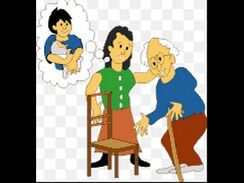
Utang na Loob
A debt of gratitude (utang na loob) is a cultural Filipino trait of repaying special favors given to them, regardless of the moral outcome. It is considered an important "accommodative surface value," along with hiya (shame) and pakikisama (togetherness). It doesn't even end with the one-time repayment of debt; most of the time, Filipinos consider this debt as something they should repay over and over, even if it takes a lifetime.
Hiya
Aside from being hospitable, Hiya is one of the many traits that Filipinos possess. Hiya has a great influence on one’s behavior for one will do everything, even if it is beyond his means just to save his reputation as well as the families. It's like the way Filipinos say sorry even if they're not at fault.
Delicadeza
Delicadeza refers to sensitivity regarding the limits of proper behavior or ethics in a situation. In simple terms, it is commonly referred to as a sense of propriety or how to behave rightly in all circumstances. It is in essence an etiquette that was passed on to us as a legacy of the Spanish culture.
Palabra de Honor
Palabra de Honoror word of honor is very important to the Filipinos. They believe that one must keep their word whenever they make a promise and it should not be broken, no matter what.
Socializing or Pakikisama
Being friendly of the Pinoy is common to all. Initial greetings to a stranger accompanied by a handshake and smile are usual to all Filipinos. Common Filipino greeting includes "Kumusta ka na?" ("How are you?"), "Anong balita?" ("What's new?"), and "Ayos ba tayo 'dyan?" ("Is everything all right?"). These prove that Filipinos are taught to show concern to others. It is our ability to get along with others to maintain good and harmonious relationships. The spirit of Pakikisama reflects that we Filipinos really value personal relations.
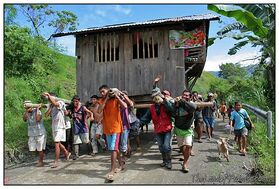
Being Cooperative
The virtue of helping each other and other people is also one of the identities of the Filipinos. We Filipinos love to work as a team and cherish the ancestral trait of Bayanihan and work with others for mutual benefit or for the common good. Filipinos are not individualistic and they prefer working in groups than all alone.
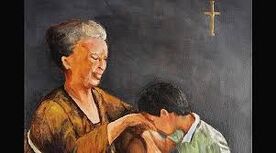
Politeness
Filipinos are taught to become respectful individuals. Due to the influence of Christianity, it tells us to honor both our parents and our elders. The use of "po" and "opo" when in conversation with an elder is a manifestation of how Filipinos respect their elders.
Flexibility, Adaptability, and Creativity
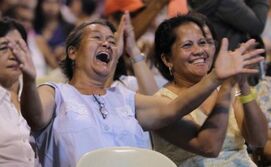
Filipino's sense of joy and humor is evident in their optimistic approach to life and its travails. The ability to laugh at themselves and their predicament is an important coping mechanism that contributes to emotional balance and a capacity to survive. These are manifested in the ability to adjust to often difficult circumstances and prevailing physical and social environments. Filipinos have a high tolerance for ambiguity that enables them to respond calmly to uncertainty or lack of information. Filipinos often improvise and make productive and innovative use of whatever is available. These qualities have been repeatedly demonstrated in their capacity to adapt to living in any part of the world and in their ability to accept change
Values of education in the Phillipines[]
What education actually means? []

The truth and meaning of education is hard to define. Firstly, the term ‘education’ can mean different things to different people. It’s a broad term that people have different ways in which they define education.
Defined by Wikipedia – “Education” in its general sense is a form of learning in which knowledge, skills, and habits of a group of people are transferred from one generation to the next through teaching, training, research, or simply through learning on your own or by you (auto didacticism).
Most of us have undergone years of learning in our formal school education. Such form of formal education has been designed to help us to become a knowledgeable and responsible citizen.
Knowledge is a familiarity with someone or something, which can include facts, information, descriptions, or skills acquired through experience or education. Skills and knowledge are required to be literate.
Being literate is more than just about being able to read and write. It makes you a better person, who you are, who you become, and how you live your life. You’ve freedom to participate in the literate society which surrounds you.
“Education is an important element in the struggle to help our children and people rediscover their identity and thereby increase self-respect. Education is our passport to the future.” Malcolm X said.
What’s the purpose of education?[]
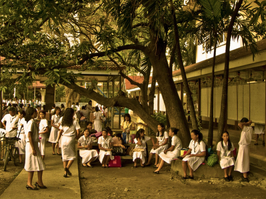
The purpose of education is prepared our children for higher education. Education can produce a generation of individuals who are better prepared for any career and can make greater contributions to society.
But education does not start at school. It starts at home. It’s a fact that as parents, our responsibility is to teach our youth as early as possible is essential and crucial. Imagine what our country would be like if we were all taught good morals, love, peace and respect.
Such values will be serve a useful purpose and beneficial for the society. This develop a sense of caring for one another, a sense of belonging to the community, a sense of respect for each other, the more concern you’re for others, the healthier is your mind. The value of education develops creative thinking skills and the value of reasoning for you.
It makes you think critically about various issues in life and take decisions from being free from bias and prejudices, superstitions and blind beliefs which can make you more enlightened. You learn all these qualities through the process of education. Education prepares us for the future, and our lives.
“The whole object of education is…to develop the mind. The mind should be a thing that works.” – Sherwood Anderson (1876–1941) American novelist and short story write
What’s the role of education to society?[]
The role of education in society is to raise the level of awareness of as many people having the abilityand willingness to learn so that as a society can better understands of how things work.
The youth of today will be the leaders of tomorrow, are we preparing them for this?
My answer is definitely NO. Our education systems need to change to educate our youth now. There are numerous problems facing our Filipino youth in today’s society. The greatest hurdles faced by the youth of Philippines today are they’re not prepared for what they will face for tomorrow’s challenges.
A better education for young people can mean better things for society. It helps and mold young people into ideal citizens and to prepare them for survival in the real world, build a strong economy, contribute to a healthier environment, and bring about a brighter future for everyone.
President Marcos when he was president, he had a clear vision of a better future for his country and his people. He knows that the foundation of every state is the EDUCATION of its youth. His most notable contributions have been in the field of education. He built more schools than all his predecessors combined. He’s long time gone, no more vision, no more courage, no more good education and no more solutions.
What role does and should our government play in education?[]
In order to guarantee success and to feel secured, Philippine government must invest time and money to education. The government has a responsibility to support and fund the programs required to be done to ensure a quality education for every student.
The economic achievement is based on education. I believe that education is the heart of a nation’s success and an aggressive willingness to compete. And that is a fact, no one can argue with that contention.
Japan, Taiwan, Singapore, Hong Kong and South Korea learned that economic dominance is centered upon the establishment of a system of best quality education. The cooperation of government and citizens in these countries committed themselves for building an impressive education system of their own and first class education systems.
Philippine government leaders must ask themselves if they have great concern for the youth education. Let’s face it; it’s so obvious that they want to make our country’s citizen dumb and ignorant.
Let your voice be heard. When lots of youth get together to show that they care about an issue or want to see change happen, you can make a real difference. So it will take a while to recover from years of continuing economic struggle. How many days, months and years of suffering? What do you think?
I hope you all learned something from this article. Education not only gives us shelter, clothes, food and other necessities but also cleans our personality and way of life and on how education plays the role in our life and society. So be educated and make all educated.

Importance of education in the philippines essay
Why is education important for being an effective leader?[]
Education is essential in the preparation for leadership because education provides as one of the best way to build the better us. It enlightened societies. Education is linked to the development and progress of the nation and the advance of the civilization.
If we measure the worth of education, it contributes a lot of things to us and those things can provide as our weapon as we encounter the real challenge of being a good leader. “A leader is one who leads, enjoys being the leader, has a vision, is confident, always believes that he/she can do everything, gets everyone involved, don’t hide information, wants everyone to be successful, and lastly is “courageous and brave.”
By being educated, we can more knowledge, better thoughts and wide understanding about our chosen area and about the people that surround you.
You cannot be a good leader if you don’t know the history of your own country, then you don’t know anything. It is extremely important to know our history, so we don’t repeat it. You should not accept a job if you cannot defend your own country and the security of your own people.
Will this election bring changes for better or for worse? []
If whoever wins, at this point I have no idea. There’s no guarantee that Filipino people will end up their suffering and replace the freedoms being taken away from them. I want to know is if it’s possible.
Other than that, I really hope and pray that this will be able to help our country and start building an economy that will lasts into the future and help them out of a terrible financial situation. I’m going to be optimistic and keep looking up!
Filipino Patriotism[]
Patriotism, Philippine-style[]
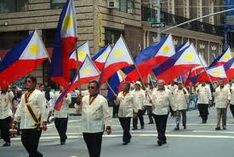
Now that we’ve elected a president who talks straight, and seems to be inspiring Filipinos to straighten out our society, is he sounding the drums for “patriotism”? Ordinarily, it’s defined as “love of country.”
If so, the patriotism of the United States is different from our brand of patriotism. And, obviously, from the patriotism of China, or of Japan, and, of course, of North Korea!
It brings to mind our “firebrand” of the Commonwealth, Manuel L. Quezon: “I prefer a government run like hell by Filipinos instead of a government run like heaven by the Americans!” Or words to that effect.
Our current firebrand, Rodrigo R. Duterte, seems to interpret patriotism as doing away with criminals—quickly by shooting them—drug lords, drug pushers, and drug addicts (who can please surrender and stop their bad habit). He also would like to kill other criminals like rapists, thieves, holdup men, kidnappers, and the like by hanging.
The President is calling on the patriotism of Filipinos to help him clean up our society, which, since 15 presidents ago, has built up filth and scum that make the government machinery not only work slowly but also, and most of the time, miss its target: the uplift of the “hopeless, helpless and defenseless”—the poor.

Patriotism Values of the Filipino People-NSTP
Patriotism varies in definition as the years go by. During Quezon’s time in 1935, it was independence from the Americans. That patriotism was a continuation of the first Asian revolution against colonialism by Andres Bonifacio and his Katipunan in 1896. It was inspired by the “reformers,” notable among them Jose P. Rizal who wrote two novels making fun of the Spanish friars and the Catholic Church.
The revolution, with the same agenda of independence, was put on more formal war footing by Emilio Aguinaldo. The national flag was sewn by the ladies Agoncillo and a national anthem was composed by Julian Felipe. The Filipino declaration of independence, the flying of the national tricolor, and the first public singing of the national anthem took place on June 12, 1898, in Kawit, Cavite.
Our patriotism is awakened every time the flag is unfurled and the anthem sung.
It is far easier to imagine and feel patriotism whenever we have a struggle, a fight with an enemy, where hundreds of thousands of Filipinos die—such as against the Spaniards in 1896, against the Americans from 1898 to 1902, and against the Japanese from 1941 to 1945.
It is a bit harder to feel patriotism when we go about the traffic-choked streets of Metro Manila or Metro Cebu to our workplaces and then go home exhausted at the end of the day. Or when the only break is taking the family to the air-conditioned mall, not to buy, perhaps, nor to eat, but just to savor the cool air, and be rid of the humidity of the tropics. It makes one wish to leave these islands for temperate climes abroad.
Now, for the next six years, a new leader is calling us to fight, not invaders, but our fellow Filipinos—a social cleansing. The initial response to the President’s call to arms is warm: Lots of people presumed to be involved in the trade in illegal drugs, and other criminals, have fallen in this war since the elections in May. And many more will fall; the toll is averaging five a day despite murmurings from the Commission on Human Rights.
At the same time, our patriotism will be tested as Mr. Duterte calls for peace. At the installation of the new Armed Forces chief of staff, Gen. Ricardo Visaya, he said his main role is to talk to the communists, the Moro Islamic Liberation Front, the Moro National Liberation Front, etc., so peace can come. The soldiers can then fight with the drug lords and others who have not sued for peace.
And with peace—and less traffic, if I may add—there will be prosperity and happiness (i.e., freedom to move about, unmolested by bombing, kidnapping, robbery, rape, cell phone snatching, air pollution, illegal street parking and sidewalk congestion.
This, then, is how I see Filipino-style patriotism, circa 2016: peace and freedom to move about, work, and play. It takes one’s breath away, leading one to wish one could stay put in good old “Pinas.”
15 SIMPLE WAYS TO SHOW FILIPINO PATRIOTISM[]
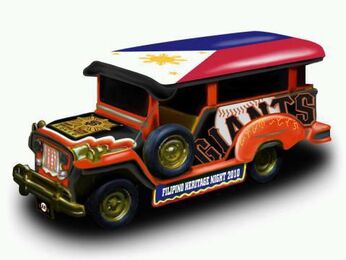
According to Wikipedia, patriotism is “a devotion to one’s country for no other reason than being a citizen of that country.” Simply saying how one is proud to be a Filipino but without action proves to be not enough. So in celebration of Philippines’ 113th Independence Day today, I listed down 15 simple ways to show the world how devoted we really are to our country and to our fellow countrymen.
1. Know that Lupang Hinirang is the title of our national anthem and not Bayang Magiliw.
2. Know our history and our national symbols. I myself just learned that Jose Rizal is yet-to-be officially declared national hero, along with 8 others.
3. Do not litter and do not smoke in public places.
4. Stay alive! Use overpasses, underpasses, footbridges etc.
5. Obey road rules so you won’t need to bribe MMDA traffic enforcers.
6. Guys, before you go out, pee! So you won’t need to do it in the streets.
7. Buy local products. Look at your shirt’s tag, it says ‘Made in the Philippines’ anyway.
8. Support local tourism. Let’s go to Batanes guys!
9. Mountaineers, when you go up there, bring your garbage down with you.
10. Report police officers riding motorcycles with no helmet.
11. Be a responsible neighbor. Just because you got the mic doesn’t mean we want to hear you belt out your fave videoke piece, especially when it’s already midnight.
12. Be a responsible FX passenger. Sit accordingly and share the aircon to everyone.
13. Watch at least one or two Filipino movies in a year.
14. Do some volunteering works or at least donate.
15. Magsalita at mag-blog sa Filipino!
References[]
https://en.wikipedia.org/wiki/Manuel_L._Quezon
http://www.studymode.com/subjects/achievements-of-manuel-quezon-page1.html
https://en.wikipedia.org/wiki/History_of_the_Philippines_(1898%E2%80%931946)
http://en.wikipilipinas.org/index.php?title=Philippine_Core_Values
https://www.youtube.com/watch?v=SXLVAckEoCs
https://www.youtube.com/watch?v=L04Y8TUxKOY
https://www.youtube.com/watch?v=QyTPLyIU8_Q
https://athanph.wordpress.com/2011/06/12/15-simple-ways-to-show-filipino-patriotism/
http://opinion.inquirer.net/95515/patriotism-philippine-style
Image --- http://asiasociety.org/education/valuing-and-sharing-benefits-education
2015 0618 PageOne – Pagmamano | PAGEONE https://www.google.com.ph/search?q=pag+mamano&biw=1707&bih=961&source=lnms&tbm=isch&sa=X&ved=0ahUKEwjK1-G4q_vQAhWGQpQKHf8fAdMQ_AUIBigB#imgrc=z-szxx5G3Bg_cM%3A
